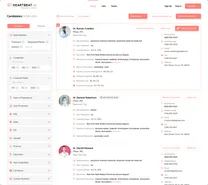Are you a nurse in Wisconsin looking to understand the licensure requirements? Navigating the Wisconsin Board of Nursing’s processes, whether you’re applying for the first time or renewing your license, can initially seem challenging. However, with clear guidance, it becomes much simpler.
The Wisconsin Board of Nursing is pivotal in maintaining high practice standards. They oversee everything from issuing initial licenses to managing ongoing educational requirements, ensuring all nurses in Wisconsin are competent and current with professional standards.
This guide will detail the board’s procedures for renewing licenses, reviewing applications, and verifying credentials. We will also discuss how Heartbeat AI can help simplify these processes for you.
Let’s get started!
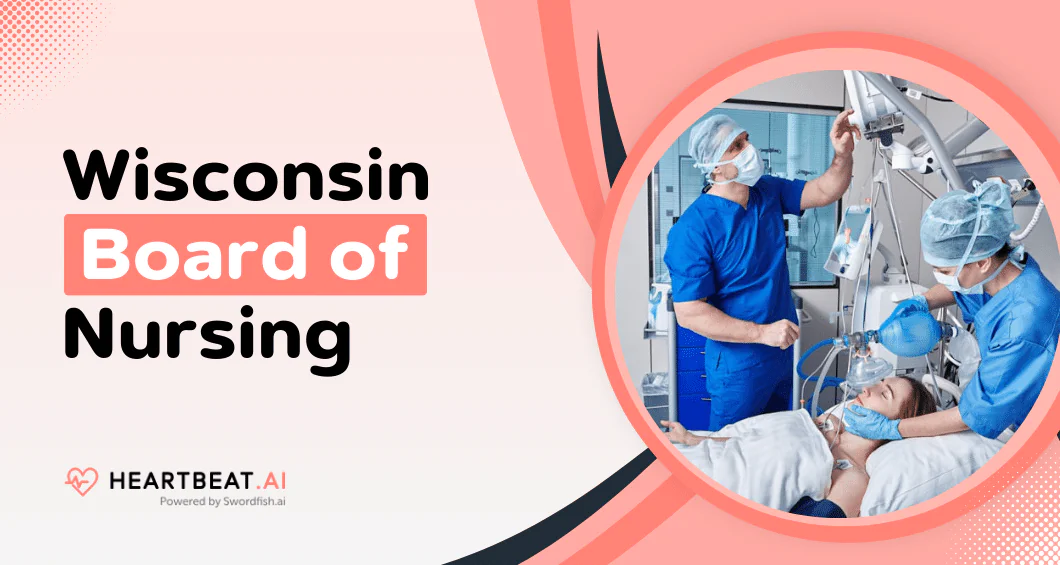
What’s on this page:
Wisconsin Board of Nursing: At A Glance
The WI Board of Nursing, under the Department of Safety and Professional Services, regulates the practice of registered nurses (RNs), licensed practical nurses (LPNs), and advanced practice nurse prescribers in the state. This board ensures that all nursing professionals meet the necessary qualifications and adhere to the highest standards of ethical and professional conduct.
Key functions of the board include licensing nurses, approving nursing education programs, enforcing nursing practice standards, and handling disciplinary issues to safeguard public health.
Contact Information
- Address: Wisconsin Board of Nursing, Department of Safety and Professional Services, 4822 Madison Yards Way, Madison, WI 53705
- Phone: (608) 266-2112
- Website: Wisconsin Board of Nursing
What is the Wisconsin Board of Nursing Responsible for?
The Wisconsin Board of Nursing, part of the Wisconsin Department of Safety and Professional Services, oversees the regulation and licensure of nurses within the state. Its primary responsibilities include:
- Licensing and Renewal: Issuing and renewing licenses for Registered Nurses (RNs) and Licensed Practical Nurses (LPNs) to ensure they meet the required qualifications and maintain high standards of practice.
- Education and Training Approval: Approving and monitoring nursing education programs is essential to ensure they meet state standards and provide adequate training. This preparation helps equip nurses for the challenges of the healthcare environment.
- Enforcement of Standards: Enforcing professional standards and state laws related to nursing practice. This includes ensuring that nurses adhere to ethical and safe practice guidelines.
- Disciplinary Actions: Investigating complaints against nurses and taking disciplinary actions is a crucial responsibility. Actions such as suspending or revoking licenses are taken if necessary to address violations of professional conduct or practice standards.
- Regulatory Updates: Keeping nursing practices up to date with the latest healthcare standards and practices by revising and implementing new rules and regulations as needed.
Wisconsin Board of Nursing Lookup
To verify the licensing status of a nurse in Wisconsin, you can use the online license verification tool provided by the Wisconsin Department of Safety and Professional Services. This tool also allows you to obtain specific details about their professional credentials.
This user-friendly system allows you to search for information on registered nurses, licensed practical nurses, and advanced practice nurse prescribers. Simply visit the department’s official website and access the “License Lookup” section.
Here, you can search by the nurse’s name, license number, or other identifiers. The search results will display comprehensive details including the nurse’s current license status, any disciplinary actions if applicable, and other pertinent licensure information.
This online tool is a vital resource for ensuring that nursing professionals in Wisconsin adhere to the required standards and regulations. It helps maintain the integrity and safety of healthcare services in the state.
Wisconsin Board of Nursing License Requirements
To qualify for a nursing license in Wisconsin, candidates must meet the following criteria:
- Completion of an approved nursing program suitable for the level of nursing practice (LPN, RN, or APRN).
- Passing the National Council Licensure Examination (NCLEX) for RNs and LPNs, or a relevant national certification examination for APRNs.
- The minimum age requirement is 18 years.
- Successful completion of a criminal background check.
- Submission of a completed application form along with the required fees to the Wisconsin Board of Nursing.
- Compliance with continuing education requirements for license renewal.
How to Get a Wisconsin Board of Nursing License
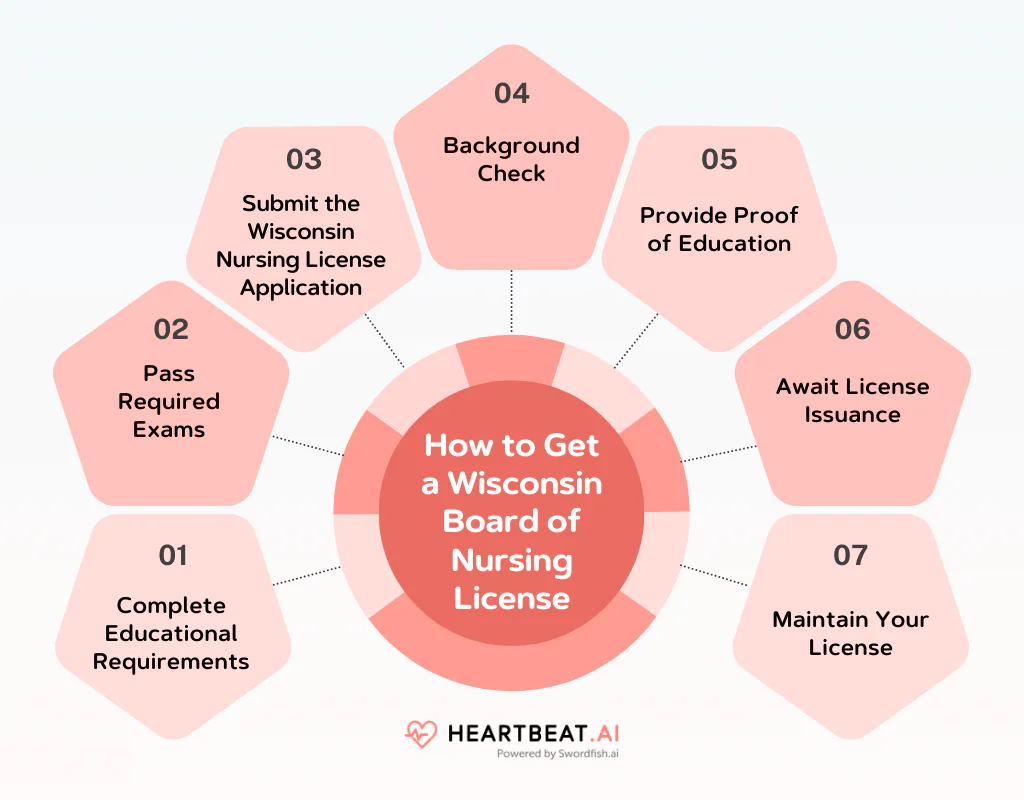
Obtaining a nursing license in Wisconsin involves a series of steps designed to ensure that you meet the state’s professional standards for nurses. Here is a detailed guide on how to navigate the licensing process:
Step 1: Complete Educational Requirements
Begin by graduating from a nursing program that is approved by the Wisconsin Board of Nursing or an equivalent accrediting body. Ensure your program qualifies you for the type of nursing license you are pursuing, whether it’s for a Registered Nurse (RN) or a Licensed Practical Nurse (LPN).
Step 2: Pass Required Exams
Registered Nurses (RNs) are required to pass the National Council Licensure Examination for Registered Nurses (NCLEX-RN) to get their licensure. Likewise, Licensed Practical Nurses (LPNs) must complete the National Council Licensure Examination for Practical Nurses (NCLEX-PN) to become licensed.
Step 3: Submit the Wisconsin Nursing License Application
Apply for licensure through the Wisconsin Department of Safety and Professional Services (DSPS). You can submit your application online or via mail. Be sure to fill out all required sections and submit the necessary application fees.
Step 4: Background Check
Complete a criminal background check, which is mandatory for all healthcare professionals applying for licensure in Wisconsin. This includes submitting your fingerprints for a thorough review.
Step 5: Provide Proof of Education
Submit official transcripts from your nursing education program directly from your school to the DSPS to verify that you have completed all required coursework and training.
Step 6: Await License Issuance
Once your application is complete, including passing your NCLEX exam and clearing your background check, the Wisconsin Board of Nursing will review your submission. Upon approval, your Wisconsin nursing license will be issued, and you will be legally eligible to practice nursing in the state.
Step 7: Maintain Your License
Wisconsin nurses are required to renew their licenses periodically and meet continuing education requirements. Stay updated on these requirements and deadlines to ensure your license remains active and in good standing.
Wisconsin Nursing Board Licensure Time Frame
The time frame for obtaining a nursing license in Wisconsin typically ranges from 7 to 15 days after all necessary documentation is correctly submitted. This process is managed by the Wisconsin Department of Safety and Professional Services (DSPS), which oversees the Board of Nursing.
Cost of Wisconsin Nursing Board License
The cost of obtaining a nursing license in Wisconsin varies depending on whether you are a first-time nurse or are transferring your license from another state. For first-time nurses, the licensing fees include a $200 NCLEX exam fee and a $72 application fee for both RNs and LPNs.
For nurses who already hold RN licensure and are seeking endorsement in Wisconsin, the application fee is $57 for RNs and LPNs, with an additional $10 fee for a temporary permit. License renewal for all nursing types (RN, LPN, APRN) also requires an application fee of $57. For detailed information on all fees and processes, it’s recommended to visit the Wisconsin licensing page.
Wisconsin Board of Nursing License Renewal
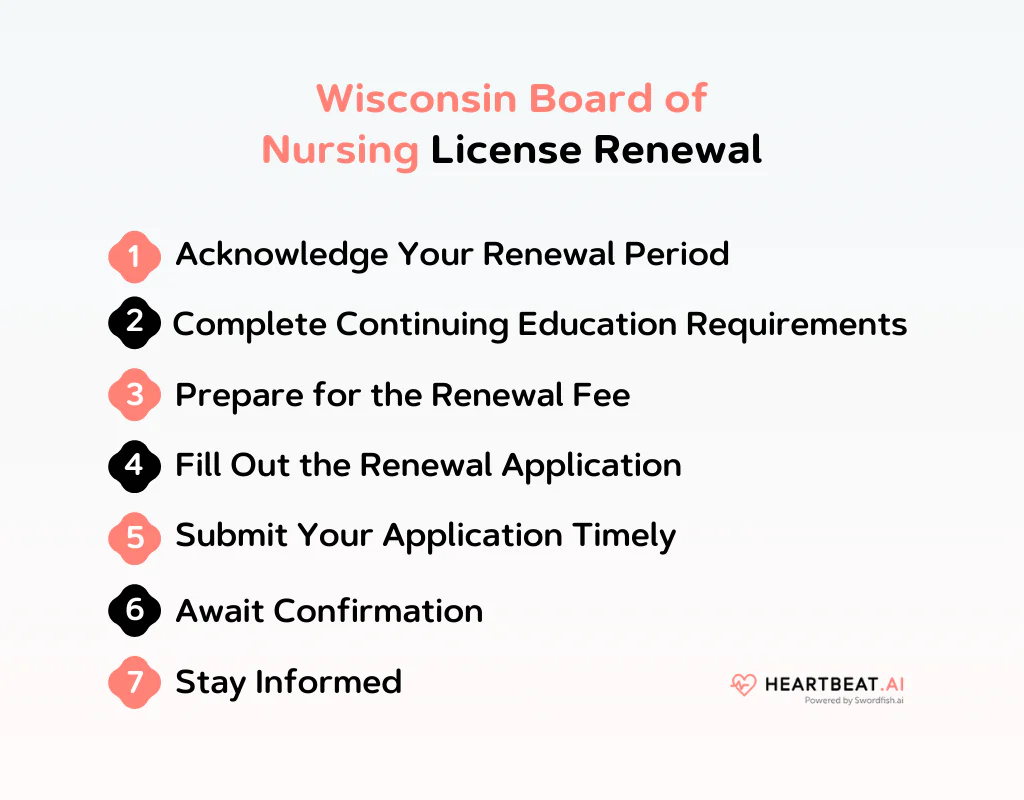
Renewing your nursing license in Wisconsin is a straightforward process that ensures you continue practicing legally and adhering to professional standards. Here is a step-by-step guide to help you successfully renew your nursing license in Wisconsin:
Step 1: Acknowledge Your Renewal Period
In Wisconsin, nursing licenses must be renewed every two years. The renewal dates are set according to your license type; Registered Nurses (RNs) renew by February 28 or 29 in odd-numbered years, and Licensed Practical Nurses (LPNs) by April 30 in even-numbered years. It’s important to be aware of your specific renewal deadline to avoid any lapse in licensure.
Step 2: Complete Continuing Education Requirements
Wisconsin requires nurses to complete continuing education (CE) as part of the renewal process. RNs are required to complete 24 hours of CE every two years, while LPNs must complete 13 hours. Ensure you complete the required CE from approved providers before your license expires.
Step 3: Prepare for the Renewal Fee
The renewal fee for nurses in Wisconsin is generally around $86 for timely renewals. Late renewals come with additional fees, so it’s best to pay on time to avoid extra charges.
Step 4: Fill Out the Renewal Application
Renewal is typically handled online via the Wisconsin Department of Safety and Professional Services (DSPS) website. The online system is user-friendly and will guide you through entering all the required information.
Step 5: Submit Your Application Timely
To prevent any interruptions in your ability to work, submit your renewal application and fee before the deadline. Ideally, start this process well in advance to accommodate any unforeseen delays or issues.
Step 6: Await Confirmation
After submitting your application, you can monitor the status of your renewal through the DSPS website. Once your renewal is processed, you will receive confirmation, and your license will be valid for another two years.
Step 7: Stay Informed
Regulations and requirements can change, so it’s crucial to stay updated on any new rules or continuing education changes that might affect your practice. Regularly checking the DSPS website will help ensure you remain compliant with current nursing standards in Wisconsin.
Wisconsin Board of Nursing License Verification
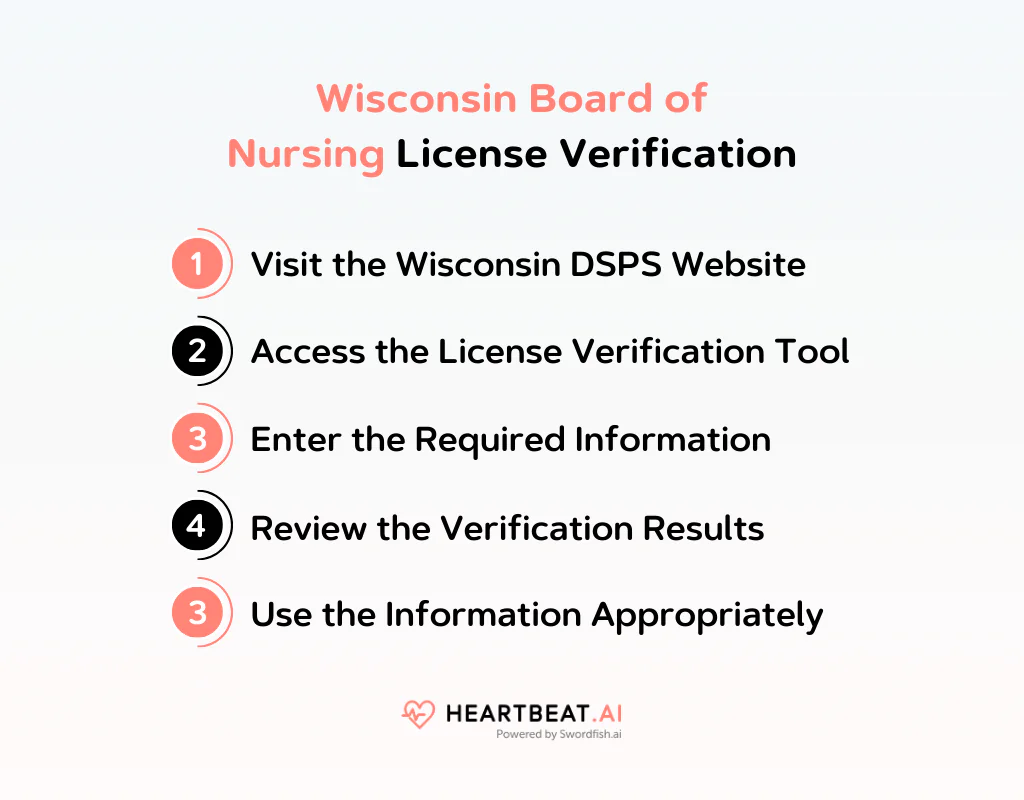
Verifying a nursing license in Wisconsin is a key step in ensuring that nurses meet the required standards to practice safely and legally within the state. The Wisconsin Department of Safety and Professional Services (DSPS) offers an online system for this purpose. Here’s how to verify a nursing license in Wisconsin:
Step 1: Visit the Wisconsin DSPS Website
Go to the official website of the Wisconsin Department of Safety and Professional Services. This site provides resources for various professional services, including nursing.
Step 2: Access the License Verification Tool
On the DSPS homepage, find the link for “License Lookup” or “Verify a License.” This feature is designed to facilitate public access to professional licensure information.
Step 3: Enter the Required Information
In the license verification section, enter the nurse’s name or license number. You can also refine your search with additional filters such as profession or city to narrow down the results.
Step 4: Review the Verification Results
After submitting your query, the system will display the relevant details of the nurse’s license, including the current status (active, expired, or suspended) and any disciplinary actions or encumbrances.
Step 5: Use the Information Appropriately
The information obtained from the DSPS website can be used for validating credentials for employment and verifying current licensure for regulatory compliance. It also ensures that care providers in healthcare facilities are duly licensed.
How Often Do Nursing Licenses Need to be Renewed in Wisconsin?
In Wisconsin, nursing licenses need to be renewed every two years. Registered Nurses (RNs) renew their licenses by the end of February on odd-numbered years, while Licensed Practical Nurses (LPNs) renew by the end of April on even-numbered years.
The renewal process involves completing continuing education requirements, which typically include 24 hours for RNs and 13 hours for LPNs, and paying the renewal fee. Nurses are encouraged to begin the renewal process well in advance of the deadline to ensure they meet all requirements and continue their practice without interruption.
How Does Heartbeat AI Simplify the Process of Getting & Renewing a Nursing License in Wisconsin?
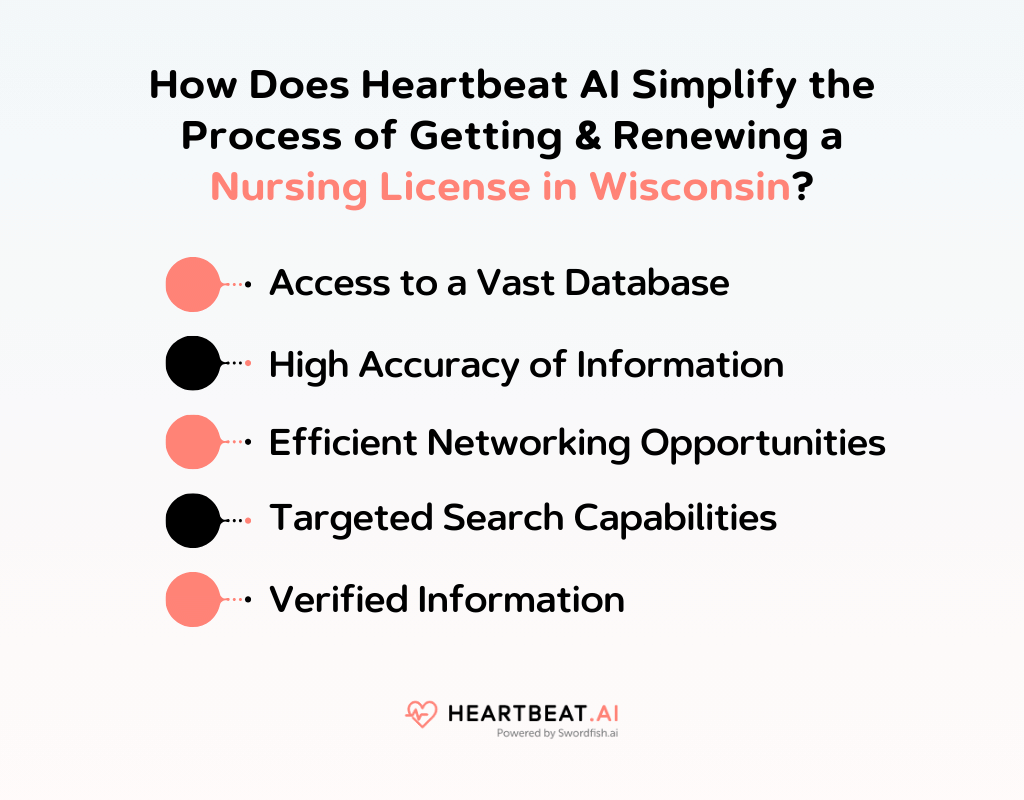
Heartbeat AI significantly simplifies the process of obtaining and renewing a nursing license in Wisconsin through its advanced technology and extensive database of healthcare professionals. By using this database, you can easily connect with professional nurses and learn about their qualifications, experiences, and compliance with state regulations.
Here are some of the features of Heartbeat:
Access to a Vast Database
Heartbeat AI offers access to comprehensive information on over 11 million healthcare professionals, including specific details relevant to Wisconsin’s nursing licensure requirements.
High Accuracy of Information
Utilizing cutting-edge data analysis, Heartbeat AI ensures that the information provided is current and precise. This reliability is crucial for nurses who need to adhere to specific continuing education requirements and stay informed about any changes in state regulations affecting their licenses.
Efficient Networking Opportunities
With the Heartbeat AI Chrome Extension, nurses can easily connect with a wide network of healthcare professionals. This network can be a valuable resource for sharing experiences, obtaining advice on the licensure process, or even discovering employment opportunities within Wisconsin.
Targeted Search Capabilities
Heartbeat AI’s Prospector Tool allows nurses to conduct specific searches based on criteria such as location or specialty. This can be especially useful for finding continuing education providers or regulatory consultants who can assist with the licensing process.
Verified Information
The platform’s File Upload feature enables nurses to ensure their contact lists and other important data are accurate. This verification prevents errors during the license application or renewal process, which can delay or complicate approval from the Wisconsin Board of Nursing.
Conclusion
In summary, we have explored the responsibilities of the Wisconsin Board of Nursing in regulating nursing practices throughout the state. Adhering to the board’s rules and regulations is vital for nurses in Wisconsin to maintain active licensure.
If you require an efficient solution to locate and network with licensed nurses in Wisconsin, as well as manage licensing processes seamlessly, Heartbeat AI offers a convenient platform. Our tool facilitates effortless connections with healthcare professionals and simplifies licensing-related tasks.
FAQs
Can I perform nursing in Wisconsin with a license from another state?
You cannot practice nursing in Wisconsin with an out-of-state license. To legally practice, you must apply for and receive a Wisconsin license through endorsement. This applies unless your license is from a state that is part of the Nurse Licensure Compact (NLC).
What should I do if my nursing license is lost or stolen in Wisconsin?
If your nursing license is lost or stolen in Wisconsin, you should immediately contact the Wisconsin Department of Safety and Professional Services. Inform them of the issue and request a replacement license as soon as possible.
What actions can lead to disciplinary measures by the Wisconsin Board of Nursing?
Disciplinary measures by the Wisconsin Board of Nursing can be triggered by several actions. These include practicing without a license, substance abuse, professional misconduct, patient neglect, or falsifying patient records. Such actions compromise patient safety and professional integrity, leading to consequences.

